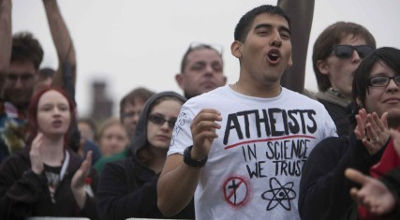Atheism Finding ‘Tolerance’ in the Name of Diversity
Nearly half of all Americans—48 percent—say the growing number of nonreligious people is “bad for society,” according to a poll conducted by the Pew Forum on Religion and Public Life.
But about the same amount—50 percent—say the rise in nonreligious people is either a good thing (39 percent) or doesn’t matter (11 percent).
The findings flesh out last year’s Pew Forum survey on the “nones,” the one in five Americans who report no formal religious affiliation. But the results also illustrate the divided reactions to this trend between those who are religious and those who are not. The study found:
- White evangelicals (78 percent) and black Protestants (64 percent) were most likely to think the growth of the nonreligious population is “bad for society.” Meanwhile, a combined 59 percent of Hispanic Catholics say the number of nonreligious people is either “good for society” (11 percent) or “does not matter” (48 percent).
- Young people are more likely to think the number of people who are not religious “does not matter”—50 percent of those between 18 and 29, compared to 34 percent of those over the age of 65.
- About one-fourth of the religiously unaffiliated say it is a “good thing” that more people are not religious, while a 55 percent majority says it doesn’t make much difference for society.
Christian Smith, director of the Center for the Study of Religion and Society at the University of Notre Dame, said the study’s findings reinforce what religion sociologists observe about the young—they are more tolerant of religious, and nonreligious, diversity.
“They have grown up in a culture that has taught them not to judge others,” he said. “Plus, younger people are simply less religious themselves, so there are more of them who would not be troubled by this.”
But John Farina, an associate professor of religious studies at George Mason University, is cautious about some of the survey’s findings.
“Most surprising is the finding that more Hispanic Catholics than white Catholics are indifferent,” he said—48 percent versus 38 percent. “That contradicts everything we hear about faithful Hispanics. I distrust this finding.”
Ryan Cragun, a sociologist of religion at the University of Tampa and author of a book about the attitudes of the religious versus the nonreligious, said he was concerned with the wording of the survey’s questions.
“Why are they specifically asking about an increase in the nonreligious rather than a decrease in the religious?” he said. “How you word questions matters.”
Still, the findings in part back up Cragun’s work with Barry Kosmin of Trinity College’s Institute for the Study of Secularism in Society about the attitudes of nonreligious Americans—that they are more tolerant of diversity and difference.
“It’s still fascinating that just under 50 percent of Americans find the increase problematic even though 80 percent claim to be religious,” Cragun said. “Either Americans aren’t as religious as they seem or they don’t think religion is such a good thing, which is pretty interesting.”
Pew conducted the survey among more than 4,000 adults nationwide; the survey has a margin of error of plus or minus 2.1 percentage points.




























































